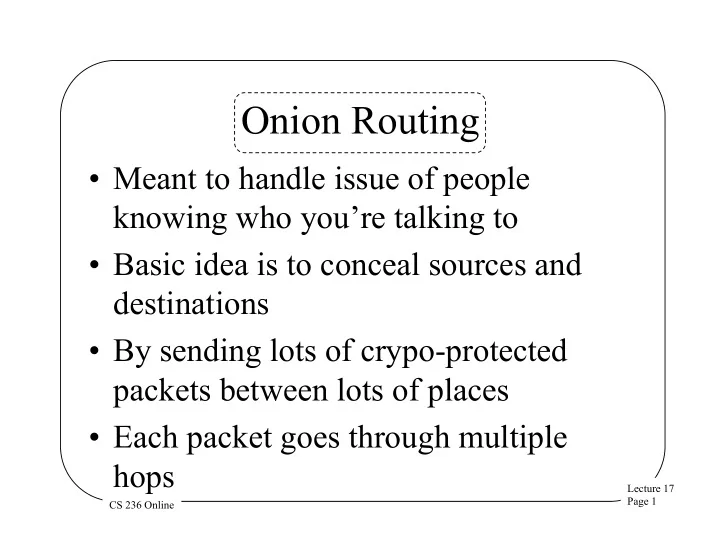

Onion Routing • Meant to handle issue of people knowing who you’re talking to • Basic idea is to conceal sources and destinations • By sending lots of crypo-protected packets between lots of places • Each packet goes through multiple hops Lecture 17 Page 1 CS 236 Online
A Little More Detail • A group of nodes agree to be onion routers • Users obtain crypto keys for those nodes • Plan is that many users send many packets through the onion routers – Concealing who’s really talking Lecture 17 Page 2 CS 236 Online
Sending an Onion-Routed Packet • Encrypt the packet using the destination’s key • Wrap that with another packet to another router – Encrypted with that router’s key • Iterate a bunch of times Lecture 17 Page 3 CS 236 Online
In Diagram Form Source Destination Onion routers Lecture 17 Page 4 CS 236 Online
What’s Really in the Packet An unencrypted header to allow delivery to Lecture 17 Page 5 CS 236 Online
Delivering the Message Lecture 17 Page 6 CS 236 Online
What’s Been Achieved? • Nobody improper read the message • Nobody knows who sent the message – Except the receiver • Nobody knows who received the message – Except the sender • Assuming you got it all right Lecture 17 Page 7 CS 236 Online
Issues for Onion Routing • Proper use of keys • Traffic analysis • Overheads – Multiple hops – Multiple encryptions Lecture 17 Page 8 CS 236 Online
Tor • The most popular onion routing system • Widely available on the Internet • Using some of the original onion routing software – Significantly altered to handle various security problems • Usable today, if you want to • IETF is investigating standard for Tor Lecture 17 Page 9 CS 236 Online
Why Hasn’t Tor Solved This Privacy Problem? • First, the limitations of onion routing • Plus usability issues – Tor’s as good as it gets, but isn’t that easy to use • Can’t help if a national government disapproves – China and other nations have prohibited Tor’s use • NSA (and others) keep attacking Tor’s privacy techniques Lecture 17 Page 10 CS 236 Online
Can’t I Surreptitiously Run Tor? • Can’t I get around government restrictions by just not telling them? • No – Tor routers must know each others’ identities – Traffic behavior of Tor routers “glows in the dark” – Tor developers keep trying Lecture 17 Page 11 CS 236 Online
Privacy-Preserving Data Mining • Allow users access to aggregate statistics • But don’t allow them to deduce individual statistics • How to stop that? Lecture 17 Page 12 CS 236 Online
Approaches to Privacy for Data Mining • Perturbation – Add noise to sensitive value • Blocking – Don’t let aggregate query see sensitive value • Sampling – Randomly sample only part of data Lecture 17 Page 13 CS 236 Online
Preserving Location Privacy • Can we prevent people from knowing where we are? • Given that we carry mobile communications devices • And that we might want location- specific services ourselves Lecture 17 Page 14 CS 236 Online
Location-Tracking Services • Services that get reports on our mobile device’s position – Probably sent from that device • Often useful – But sometimes we don’t want them turned on • So, turn them off then Lecture 17 Page 15 CS 236 Online
But . . . • What if we turn it off just before entering a “sensitive area”? • And turn it back on right after we leave? • Might someone deduce that we spent the time in that area? • Very probably Lecture 17 Page 16 CS 236 Online
Handling Location Inferencing • Need to obscure that a user probably entered a particular area • Can reduce update rate – Reducing certainty of travel • Or bundle together areas – Increasing uncertainty of which was entered Lecture 17 Page 17 CS 236 Online
So Can We Have Location Privacy? • Not clear • An intellectual race between those seeking to obscure things • And those seeking to analyze them • Other privacy technologies (like Tor) have the same characteristic Lecture 17 Page 18 CS 236 Online
The NSA and Privacy • 2013 revelations about NSA spying programs changed conversation on privacy • The NSA is more heavily involved in surveillance than previously believed • What are they doing and what does that mean for privacy? Lecture 17 Page 19 CS 236 Online
Conclusion • Privacy is a difficult problem in computer systems • Good tools are lacking – Or are expensive/cumbersome • Hard to get cooperation of others • Probably an area where legal assistance is required Lecture 17 Page 20 CS 236 Online
Recommend
More recommend